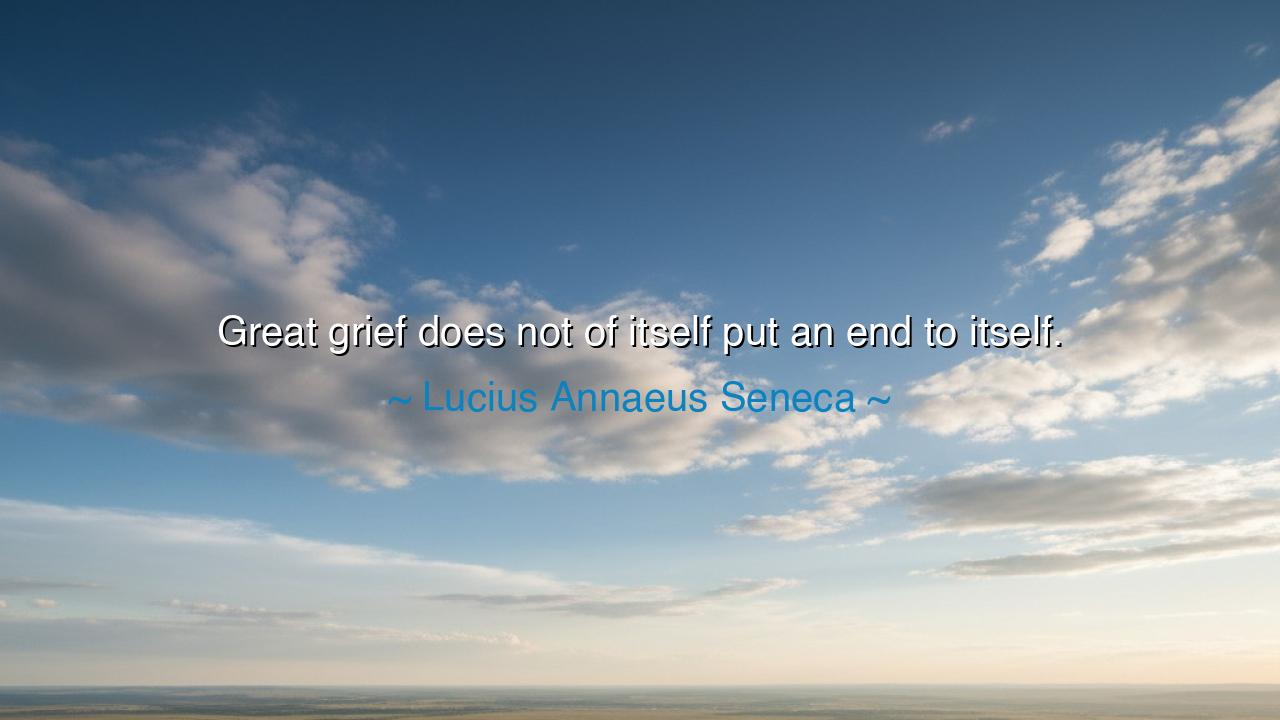
Great grief does not of itself put an end to itself.






Lucius Annaeus Seneca, the Stoic sage of Rome, once wrote: “Great grief does not of itself put an end to itself.” In this brief sentence, sharp as a blade, he reveals the nature of sorrow — that it is not like a storm that rages and passes of its own accord, but more like a wound that festers if untended. Grief is powerful, enduring, and it does not vanish simply because time moves forward. The sufferer must learn to confront it, to work with it, to transform it into wisdom, lest it remain like a shadow clinging to the heart.
The ancients knew this well, for death and loss were ever near. In the tragedies of Sophocles and Euripides, the mourner often cried out not only in pain, but in despair that the pain would not leave. Great grief is not defeated by waiting; it must be met with reason, with courage, and with the discipline of the soul. Seneca, steeped in the Stoic teaching, calls his disciples to active labor: do not sit idly and hope for sorrow to dissolve; train the mind, and through philosophy, reflection, and virtue, turn grief into strength.
History gives us countless mirrors of this truth. Consider Queen Victoria after the death of Prince Albert. For decades she carried her mourning, dressing in black, avoiding festivities, allowing sorrow to shape her reign. The grief did not end itself; it endured, because she allowed it to remain untended except by memory. In contrast, think of Abraham Lincoln, who bore immense grief at the death of his son Willie during the Civil War. Though broken in spirit, he chose to channel his pain into a deeper compassion for his nation, seeing in every family’s loss a reflection of his own. His grief did not vanish, but by action and meaning he transformed it into endurance.
Seneca’s wisdom reminds us that grief can be both a weight and a teacher. If left unchecked, it grows heavier, pressing the soul into despair. But if examined, if brought into the light of reflection, it may become the seed of greater compassion. The Stoics did not deny sorrow; they taught that it should be felt, but not allowed to govern. Great grief demands acknowledgment, but also mastery. We must not expect it to fade like morning mist; we must wrestle with it until it yields understanding.
This truth is as urgent now as it was in Seneca’s Rome. How often do we hear the words, “Time heals all wounds,” and yet see lives destroyed by unaddressed sorrow? Time alone does not heal — it is what we do with time that brings healing. Action, reflection, support, and courage are the medicines; without them, wounds of the heart remain open. Seneca calls us to awaken, to recognize that grief is not an intruder that leaves of its own will, but a guest that must be transformed if it is not to consume us.
Practical wisdom follows from this. When grief comes, do not hide it, nor expect it to vanish on its own. Speak it, write it, pray it, work through it with others. Seek philosophy, seek friendship, seek meaning. Transform your pain into service, as Lincoln did, or into art, as so many poets and painters have done. Do not wait passively for sorrow to end, for it will not. Instead, engage it, and through the labor of the soul, you will find not forgetfulness, but strength.
So, O children of the future, take heed of Seneca’s austere but merciful truth: “Great grief does not of itself put an end to itself.” Do not despair when grief lingers, for this is its nature. Instead, rise to meet it, as a warrior meets an adversary — not with hatred, but with discipline and courage. If you do, grief will not vanish, but it will be tamed, and in its place you will find wisdom, compassion, and the unyielding dignity of one who has endured and triumphed over the storms of the heart.






AAdministratorAdministrator
Welcome, honored guests. Please leave a comment, we will respond soon